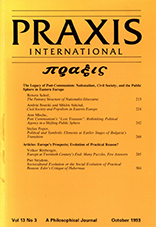Political and Symbolic Elements at Earlier Stages of Bulgaria's Transition
Political and Symbolic Elements at Earlier Stages of Bulgaria's Transition
Author(s): Stefan PopovSubject(s): Politics / Political Sciences
Published by: Blackwell Publishing Ltd
Summary/Abstract: The deep social and historical reasons that Bulgaria has been one of the most badly damaged countries in the Soviet Bloc are a subject to which we will return time and again. Put briefly, however, a general diagnosis may run as follows: Not only did this country's society turn out to be highly susceptible to the Soviet type of communist utopia; it demonstrated in a number of respects an enormous adaptability for appropriating and applying Soviet patterns even more enthusiastically and consistently than did the Soviets themselves. The communist coup in 1944 soon acquired the form of a massacre. The so-called People's Court of Justice killed hundreds of innocent citizens, including almost all the members of the last National Assembly. Bulgaria, we now know, had some sixty to eighty concentration camps in the fifities and sixties. On the other hand, it had neither dissident movements nor uprisings as did other countries in '56 or '68. In the seventies, private ownership was completely abolished in the rural areas. In the same period, the PartyState advanced what they called "the state-social principle" which marked a new, in fact ultimate stage in the process of setting up centralized administrative control over all areas of social life, business, economy, culture, and education. The Eastern Orthodox Church has never played a substantial political role, but it also has never been a reliable source of oppositional ideas and activities. Due, in part, to its specific ideological constitution, it was easily devoid of spiritual independence and its leadership even collaborated with the Communist Party-State.
Journal: PRAXIS International
- Issue Year: 13/1993
- Issue No: 3
- Page Range: 268-284
- Page Count: 17
- Language: English

